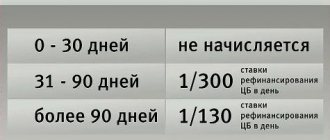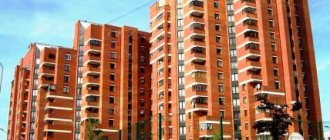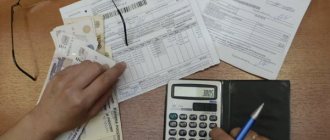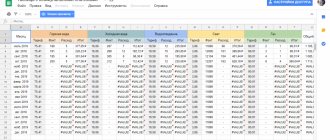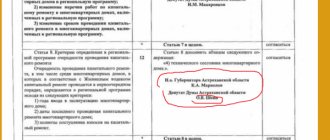How are penalties calculated for late payments for utilities?
A penalty is a penalty that arises as a result of failure to provide payment on time as stipulated in the bilateral agreement between the contractor and the consumer of the service. The amount of the penalty is different for each type of payer and depends on the period of delay in payment.
Article 155, paragraph 14 of the Housing Code[1] provides public utilities with a legal basis for calculating fines. A mechanism for calculating penalties has been developed by law. Since 2011, the law has come into force and is applied in all sectors of public utilities.
The accrual of penalties applies to debtors who are overdue for payments by 30 days. The settlement date is usually specified in the contract concluded between the consumer and the service provider. And the debt begins to count from the day following the settlement date.
For a tenant receiving housing and communal services, general rules for calculating penalties have been legislatively developed and recommended.
- From 31 to 90 days after the agreed payment deadline, the amount of penalties is 1/300 of the Central Bank key rate. Until 2021, the refinancing rate was used, which was a constant value;
- from 91 days the figure increases to 1/130 of the rate, which is not a constant number. To correctly calculate the fine amount, information on the rate can be found on the official website of the Central Bank.
Enterprises providing services for heat supply, water supply, sanitation, management companies differentiated amounts with the following breakdown by period:
- Up to 60 days of delay in payment - 1/300 of the stated rate.
- From 61 to 90 days the value increases to 1/170 of the same rate.
- From 91 days onwards – 1/130 of the key rate.
Enterprises providing other security services, as well as homeowners' associations and housing cooperatives, who charge charges for the maintenance of residential space, did not differentiate and assigned to their consumers a single penalty amount from the first day of late payment in the amount of 1/300.
With an advance payment system, it is better to coordinate the scheme and the moment of debt accrual with the service providers.
Collection of accrued amounts for penalties occurs in court by adding the calculation of penalties to the main debt.
The announced new rules for calculating penalty payments for late payment in 2021 consist of changing the stable refinancing rate to the floating key rate of the Central Bank. The refinancing rate remained at 11% for a long time. The key rate has lowered this threshold, and the current value at the time of the financial transaction is used to calculate the penalty.
Calculation of penalties for late payment of utilities
The generally accepted rule is that utility bills must be paid every month no later than the tenth day. If services are provided under an agreement, then it usually indicates by what date it is recommended to make payments. In case of untimely or incomplete payment for services provided, the Russian legislative framework provides for the accrual of a penalty, the so-called penalty. These provisions are clearly stated in the Housing Code.
The law states that for late payment for services provided, the homeowner will have to pay a fine. The amount of the penalty is established by the relevant law and amounts to a certain refinancing rate of the Russian Central Bank for the entire period of non-payment of the debt.
The process of calculating fines (penalties) begins after the end of the established payment period, immediately the next day. The penalty will be accrued until the entire debt is repaid.
The Rules for the Provision of Utility Services stipulate that if the owner of housing in an apartment building cannot repay the entire debt for valid reasons, then it is necessary to contact the appropriate services to conclude an agreement on installment payments. A valid reason is dismissal from work, loss of a breadwinner, etc. To avoid the accrual of penalties, it is recommended to immediately contact the Housing Office with such a problem.
Is it possible not to pay penalties on utility bills?
The only possible reason when accrual of a penalty is unlawful is the consumer’s departure from the city. The tenant must notify the utility company about his absence in writing, preferably before making the trip. If for some reason the service company was not notified by you, this can be done after arrival, but no later than a month later.
The application for the absence of a consumer must be accompanied by documents confirming your absence. Payments are deferred. The period for which penalties are not accrued may not exceed six months. If you are detained for a longer period, you can send a registered letter to the service company with a request to extend the period of non-residence. The main condition is that no one will actually live in the apartment.
Penalties are calculated by utility organizations. Enter accrued amounts into payment receipts. You can independently double-check accounting calculations and make adjustments if you disagree with the calculation provided and the charges are illegal.
The procedure for calculating penalties from January 2016
For citizens of housing cooperatives and homeowners' associations, starting from 2021, the law indicates that penalties will be calculated according to the following scheme:
- no penalty is charged during the first month;
- if there is a delay of two to three months, penalties are calculated at 1/300 of the refinancing rate of the Russian central bank;
- the new law also states that after three months, the amount of the penalty will increase to 1/130 of the refinancing rate for each overdue day;
- the law allows for service disconnection or legal action if the homeowner continues to ignore payment.
The law provides for the following fines for company managers and enterprises:
- if the overdue period is 3–4 months, then the refinancing rate will be 1/170;
- if the period of delay is more than 91 days, the daily rate will be 1/130.
Litigation regarding utility bills
By filing a lawsuit, utility companies add the amount of the penalty to the principal debt. Based on Article 196 of the Civil Code of the Russian Federation[2], the deadline for the claim begins three years after the accruals are presented. This means that during the trial, debt that arose in the early period will not be considered. To do this, the defendant-tenant must declare this during the process.
Without a statement of limitation by the tenant, the trial will take place, and the amounts will be considered lawful. A similar decision will arise if the defendant pays funds to repay the principal debt or penalty amounts during the limitation period.
For example, the period of debt under consideration is July 2014 – January 2015. The statute of limitations has expired, but in December 2014 the consumer paid part of the accrued amount of the disputed issue indicating the current period. Thereby acknowledging the debt and losing the right to apply the statute of limitations.
According to statistics, the introduction of the Federal Law on the Application of Penalties to Debtors, the number of unscrupulous payers decreased to 6%, which had a positive impact on the work of providing companies.
Basic principles for calculating penalties
In order for a debtor - an individual to be charged penalties for utilities starting from 2021, he must not pay for at least 1 month. According to paragraph 14 of Art. 155 of the Housing Code of the Russian Federation, fines are accrued from the 31st day following the deadline for payment of fees. The amount of the penalty is 1/300 of the refinancing rate established by the Central Bank of the Russian Federation. The calculated amount will be automatically entered into the receipt along with the debt and the current payment within 90 calendar days. If three months is not enough for the debtor to make a full settlement, he will have to pay 2 times more: from the 91st day, payments are made taking into account 1/130 of the rate of the Central Bank of the Russian Federation.
Let us recall that the refinancing rate in question is now equal to the key rate of the Central Bank of the Russian Federation, which the financial regulator reviews at least once a quarter. From 12/17/18 this figure is 7.75%.
The above amounts of penalties concerned only debts on utility bills. In case of incomplete or untimely payment of contributions for major repairs, the amount of the penalty is 1/300 of the rate of the Central Bank of the Russian Federation. It is also accrued from the 31st day of delay, but its size does not increase, regardless of when the payer repays the debt. This is stated in clause 14.1 of Art. 155 Housing Code of the Russian Federation.
Please note that creditors are prohibited from increasing the amount of penalties. In addition, additional interest cannot be charged on the penalty. This follows from paragraph 5 of Art. 395 of the Civil Code of the Russian Federation.
The moratorium on fines for non-payment of housing and communal services will not be extended in 2021
The Ministry of Construction reported that the moratorium on collecting fines for late payment of utility services will not be extended for 2021.
Izvestia writes about this with reference to the response of the Ministry of Construction to State Duma deputy Anatoly Vyborny. The deputy contacted the department in December, when there was an increase in COVID-19 cases, and there was no certainty about the further implementation of Government Resolution No. 424.
The letter from the Ministry of Construction emphasizes that since the beginning of this year, the provision of utility services and payments for consumed utility resources have been carried out in accordance with the current housing legislation of the Russian Federation without the concessions that were established by the Cabinet last April. Thus, during the pandemic, utility companies, distribution centers and municipal waste disposal operators were prohibited from suspending the provision of utility services if they were not paid in full. Now this measure will be applied again.
The response was signed by Deputy Minister Maxim Egorov.
It is also reported that the Ministry of Construction, together with the Ministry of Labor, has taken measures aimed at reducing social tension and supporting citizens in the context of COVID-19.
“Russian Government Decree No. 420 dated April 2, 2020 “On amendments to the Rules for the provision of subsidies for housing and utilities” has been extended until April 1, 2021. If the period for providing a subsidy expires between October 1, 2021 and April 1, 2021, the subsidy is provided in the same amount for the next six months without an application,” the department clarifies.
According to the Ministry of Construction, the pandemic is gradually receding, the number of cases is decreasing, which means the moratorium can be lifted.
“In connection with the decision already made to extend until April 1 the government decree on additional subsidies for the payment of residential premises and utilities, the moratorium has lost its relevance. Now, compared to the end of last year, there is no acute situation with COVID-19; the number of cases is steadily decreasing. In addition, according to experts, it will be possible to resolve the issue of installment plans individually directly with the management company,” the deputy commented to the publication on the decision of the Ministry of Construction.
Representatives of management companies generally believe that this resolution should not have been adopted.
In their opinion, people finally relaxed and stopped paying altogether. Nikolai Palchenko, head of the regional branch of the Party of Growth in the Murmansk region, co-owner of MPZ Ascona JSC, comments.
“It’s funny to watch how specialists from the Ministry of Construction, trying to look naive, show first-order logic: “Since these measures were taken in connection with Covid, then with the pandemic subsiding, they must be canceled.”
In my opinion, a more appropriate and objective logic is as follows:
“Covid caused serious economic problems, which in turn led to a decrease in the income of the population, which is why the moratorium was introduced. Hence the simple conclusion - the moratorium should be lifted not when the coronavirus has receded, but when the country can overcome the economic problems caused by the pandemic. And this process is not quick.”
As for the management company, unfortunately, the ill-conceived reform of housing and communal services has led to the fact that management companies are disconnected from the interests of citizens, and their activities are aimed at making a profit at any cost. So in this matter their opinion is biased and biased.”
